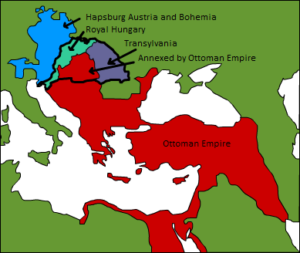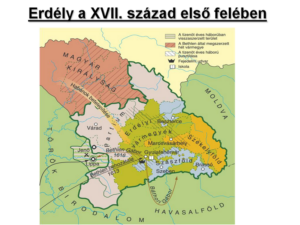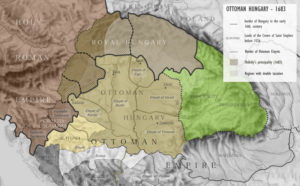General Chronology of Hungarian-Ottoman wars between 1552 and 1699

I have already made a list of the events between 1366 and 1552. Now, let us see the second part of the general chronology of historical events of the Hungarian-Ottoman wars. I included a few important dates from European history for the sake of orientation. I decided to close this chronology with the year 1699. Later, there were more battles against the Ottoman Empire but those wars should be listed rather among the Habsburg-Ottoman wars. Yet, there were Crimean Tatar raids against Transylvania well into the 18th century, and many Hungarians fought in the Habsburg army until the retaking of Nándorfehérvár / Belgrade in 1790.

1551–1555 – Transylvania in Habsburg hands;
1552. February 19 – the Peril of Szeged: Tót Mihály, former judge of Szeged attacked Szeged with his Hajdú warriors, took the palisade but could not take the castle; Pasha Hádim Ali of Buda arrived and defeated the army of Tót and Aldana;
1552 July 9 – Hádim Ali took Drégely castle, defended by Szondy György, after a heroic 3-day-long siege, then he took several smaller castles in Upper Hungary;
1552. August 9–10. – In the Battle of Palást, Hádim Ali defeated the army of Chief Captain Teuffel;
1552. July 27– Kara Ahmed, Second Vizier took Temesvár castle after a 32-day-long siege;
1552 – the end of August, the beginning of September: the castle of Szolnok was taken by the army of Kara Ahmed and Hádim Ali;
1552. 10 September – 18 October – The siege of Eger Castle, defended by Dobó István was lifted, Kara Ahmed and Hadim Ali went home after 38 days;
About Eger castle’s siege:
1553 – Mary Tudor became the first queen regnant of England and restored the Church of England under Papal authority;
1556 – the Military Council of Vienna was established;
1556 – János Zsigmond and Izabella were called back to Transylvania by the Estates;
1556 – the first siege of Szigetvár castle, an Ottoman defeat;
1557 – Habsburg Spain declared bankruptcy. Philip II of Spain had to declare four state bankruptcies in 1557, 1560, 1575, and 1596;
1558-1583 – Livonian War between Poland, Grand Principality of Lithuania, Sweden, Denmark, and Russia;
1562 – In the battle of Hadad, Balassa beat the troops of King János Zsigmond;
1562-98 – French Wars of Religion between Catholics and Huguenots;
1565 March 13 – a treaty was signed between King Maximilian I and King János Zsigmond in Szatmár: the latter resigned from his royal title and his heirs could claim only Transylvania, not the entire Hungarian Kingdom in the future;

1565 – the Hospitallers, a Crusading Order, defeated the Ottomans at the siege of Malta;
1566-1648 – the Eighty Years’ War between Spain and the Netherlands;
1566 June – János Zsigmond and Sultan Suleiman met in Zimony;
1566. 09 June – Pasha Pertef took Gyula castle (defended by Kerecsényi László);
1566. 01 August–07 September – the heroic defense of Szigetvár castle, Zrínyi’s last stand, the death of Sultan Suleiman;
1568 – Edict of Torda, the four religions of Transylvania were free to coexist;
1568. 17 February – the Treaty of Edirne (Drinápoly) was signed between King Maximilian I (1564-1576) and Sultan Selim II;
1569 – the Polish-Lithuanian Commonwealth was created with the Union of Lublin which lasted until 1795;
1570 16 August – The Treaty of Speyer was signed between János Zsigmond and King Maximilian (János Zsigmond is Prince of Transylvania, the Transylvanian Principality was accepted, and the Partium was added to its territory);

1571 May – Báthori István was elected as Prince of Transylvania;
1571 – Pope Pius V completed the Holy League as a united front against the Ottomans; the Battle of Lepanto;
1572 – France: Catherine de Medici instigates the St. Bartholomew’s Day massacre;
1575. 07 August – The Battle of Kerelőszentpál, Báthori István defeated the usurper Bekes Gáspár;
1575 December – Sultan Murad III sent a new adhname to Báthori István (the tax increased from 10 to 15,000 gold pieces);
1576 – Báthori István was crowned as a Polish king in Krakow;
1576 – Sultan Murad III accepted Báthori Kristóf as the Voivode of Transylvania (1576–1581);
1579 – the Union of Utrecht unified the northern Netherlands;
1581 – Sultan Murad III accepted the child Báthori Zsigmond (son of Báthori Kristóf) as the Voivode of Transylvania; the Diets declared his maturity in 1588, he reigns 1581–1598, 1598–1599, 1601-1602;
1591/93–1606 – the 15-Year-War between the Habsburgs and the Ottomans;

Here is the history of the 15-Year-War, in detail (39 parts):
https://www.hungarianottomanwars.com/chronologie/the-fifteen-year-war-series-1591-1606/
1593 June 22 – the Battle of Sziszek, the Pasha of Bosnia was defeated;
1594 September – Grand Vizier Sinan took Győr;
159 October – the Siege of Komárom, the Ottomans failed to take it;
1595 January – Emperor / King Rudolf (1576–1608) and the men of Prince Báthori Zsigmond of Transylvania signed a Treaty in Prague;
1595 September – the Christians took Esztergom back;
1595 October – the troops of Prince Báthori and Voivode Vitáz Mihály of Wallachia beat the Ottomans at Gyurgyevó at the Lower Danube;
1596 October – Sultan Mehmed III took Eger castle, and a new Elayet was organized;
1596 October 26 – the Battle of Mezőkeresztes, Ottoman victory;
1598 – Prince Báthori Zsigmond resigned but returned soon;
1598 – the Imperial troops took Győr, led by Pálffy Miklós and Adolf Schwarzenberg; the Ottomans besieged Várad but could not take it; Buda was besieged by the Imperial army but they could not take it, either;
1598 – the Edict of Nantes ended the French Wars of Religion;
1598-1613 Russia descended into anarchy during the Times of Troubles;
1599 – Báthori Zsidmond resigned again, and the new Prince became his cousin, Báthori András but he suffered a defeat from Voivode Vitéz Mihály (Mihai Viteazul) and died;

1599–1600 – Vitéz Mihály (Mihai Viteazul) ruled Transylvania;
1600 October – The Ottomans took Kanizsa, and organized a new Elayet;
1601 – Báthori Zsigmond was Prince of Transylvania, again (1601–1602);
1601 – In the Battle of Kinsale, England defeated Irish and Spanish forces, driving the Gaelic aristocracy out of Ireland and destroying the Gaelic clan system;
1603 – The short reign of Székely Mózes in Transylvania, his defeat and death;
1603–1604 – The terror of General Basta in Transylvania;
1604 October – the captains of the Hajdú warriors allied with Bocskai István;
1604 October 15 – Bocskai beat the Imperials at Álmosd, the beginning of the Bocskai Uprising;
1604 November – Bocskai’s army is defeated by Basta at Osgyán and Edelény;
1605 April – The Diet of Szerencs, Bocskai was elected as Prince of Hungary;
1605 September – Bocskai was elected as Prince of Transylvania at the Diet of Medgyes;
1605 October – Grand Vizier Lala Mehmed took Esztergom back from the Imperials;
1605 November-December – Bocskai held a meeting at Korpona, and gave privileges to the Hajdús;
1605 November – Bocskai meets Grand Vizier Lala Mehmed at Pest on the Rákos Field, he received an adhname and a crown;
1606 May 23 – the Treaty of Vienna between Bocskai and Emperor Rudolf;

1606. 11. 11. – the Peace of Zsitvatorok ended the 15-Year-War between Emperor Rudolf and Sultan Achmed I (a truce for 20 years);
1606. December – the death of Prince Bocskai István;
1607. February–1608. March – the reign of Prince Rákóczi Zsigmond in Transylvania (he resigned in favor of Bethlen Gábor);
1607–1608 – the second Hajdú uprising;
1608. October-November – Emperor Rudolf resigned and Emperor Matthias II (1608-1619) was elected; Matthias accepted the Treaty of Vienna, too;
1610 – the Polish-Lithuanian Commonwealth army defeated the combined Russian–Swedish forces;
1613–1629 – the reign of Prince Bethlen Gábor in Transylvania; Bethlen was elected by the Diet, with Ottoman military support;
1615 – the First Treaty of Nagyszombat (Trnava) was signed between Bethlen and Emperor Matthias II;
1616 – Bethlen ceded Lippa castle to the Ottomans;
1617 – the Second Treaty of Nagyszombat;
1618 – the Bohemian Revolt precipitates the Thirty Years’ Wars, which devastated Europe;
1619–1621 – the first anti-Habsburg war of Bethlen Gábor;

1619. November – the Transylvanian army surrounded Vienna but lifted the siege;
1620. 25. August – the Diet of Besztercebánya (Banská Bistrica) elected Bethlen as a king of Hungary;
1620-1621 – Polish-Ottoman War over Moldavia;
1621 – the Battle of Chocim: Poles and Cossacks under Jan Karol Chodkiewicz defeated the Ottomans;
1621. 31 December – the Treaty of Nikolsburg was signed between Bethlen and Emperor Ferdinand II (reigned 1619-1637);
1623 – Bethlen Gábor’s second war against the Habsburgs;
1624-1642 – as chief minister, Cardinal Richelieu centralized power in France;
1624. May – the Second Treaty of Vienna was signed between Bethlen and Ferdinand;
1626 – Bethlen Gábor’s third war against the Habsburgs;
1626. September – the clashes between Bethlen and General Wallenstein;
1626. December – the Treaty of Pozsony was signed between Bethlen és and Ferdinand;
1629. November – Bethlen Gábor died, his successor was his wife, Brandenburgi Katalin (ruled 1629–1630);

1630. September – Brandenburgi Katalin was made to resign, Bethlen István seized the power for a short time;
1630 – the third Hajdú uprising;
1630. December – Bethlen István resigned at the Diet of Segesvár, Rákóczi György was elected as Prince of Transylvania (rules 1630-1648);
1636. October – Prince Rákóczi I György defeated the usurper Bethlen István and his Ottoman auxiliary troops at Szalonta;
1642. June – György, the son of Prince Rákóczi György received Ottoman approval for his future reign;
1642 – the beginning of the English Civil War, the conflict will end in 1649;
1644–1645 – the anti-Habsburg war of Prince Rákóczi György, he occupied seven counties of the Upper Lands of Hungary;
1645 –Rákóczi’s troops joined the Swedish units at Brünn (Brno), in Moravia;
1645-1669 – Ottoman war with Venice. The Ottomans invaded Crete and captured Canea;
1645. December – the Treaty of Linz was signed between Prince Rákóczi György I and Emperor Ferdinand III (reigned 1637–1657);
1648. October – Prince Rákóczi György I died, and his son, Rákóczi György II became the ruler of Transylvania (ruled 1648–1660);

1648-1653 – the Fronde civil war in France;
1648-1667 – the Deluge wars left Polish-Lithuanian Commonwealth in ruins;
1649-1653 – the Cromwellian conquest of Ireland;
1656-1661 – Mehmed Köprülü was Grand Vizier;
1657 – Prince Rákóczi György II launched his Polish war, marched in Warsaw, then his army was captured by the Crimean Tatars;
1657 November – the Transylvanian Diet put down Rákóczi and elected Rhédey Ferenc as Prince but Rákóczi returned in January 1658;
1658. – the punishing campaign of Grand Vizier Köprülü Mehmed against Rákóczi; the taking of Jenő castle; the Turks put Barcsay Ákos on the throne (rules 1658-1660); strict terms of peace, the Transylvanians must pay 500,000 Thallers, and the annual tax was increased to 40,000 gold Forints;
1659–1660 – the contest for power between Rákóczi György and Barcsay Ákos;
1660 – Rákóczi György suffered a defeat at Szászfenes, and died soon; Várad castle was taken by the Ottomans;

1661 January – the Diet put down Barcsay and elected Kemény Jánost as the Prince; Kemény had Barcsay executed;
1661 September – the Ottomans ordered the election of Apafi Mihály (rules 1661–1690);
1662 January – the Battle of Nagyszőllös, Pasha Kücsük Mehmed of Jenő castle (supporter of Apafi) defeated Kemény János who died there;
1663–1664 – Ottoman campaigns against Royal Hungary (Pasha Köprülüzáde Fázil Ahmed’s attacked between 1661 and 1676);
1663 August – Pasha Achmed beat Chief Captain Forgách Ádám of Érsekújvár at Párkány (Sturovo);
1663 September – the siege of Érsekújvár (Nove Zámky) castle, the Ottomans took it and organized an Elayet;
1664 January-February – the Winter Campaign of Zrínyi Miklós (Nikola Zrinski), the taking of smaller castles, the burning of the bridge of Eszék (Osiek);
1664 April-May – the Christians failed to take Kanizsa castle;
1664 30 June – the Turks took Zrínyi-Újvár castle, and demolish it;
1664 01 August – the Battle of Szentgotthárd, General Montecuccoli defeated the Ottoman army;
1664 10 August – the Treaty of Vasvár was signed (between Pasha Köprülü Fázil Achmed and Simon Reniger)

1664 11. – Zrínyi Miklós died (hunting accident);
1666 August – the Wesselényi Conspiracy began in Murány castle;
1666 19 December – Wesselényi, Zrínyi Péter, Nádasdy signed a treaty against the Habsburgs;
1669 April – Prince Rákóczi I Ferenc signed a treaty with the Protestants in Sárospatak;
1671. 30. April – Zrínyi, Frangepán, and Nádasdy were executed in Bécsújhely and in Vienna;
1672–1677 – the anti-Habsburg “kuruc” movement;
1672 August-September – the “kuruc” troops defeated the Imperials at Enyicke but later suffered a defeat at Györke;
1672-1673 – an Ottoman campaign to help the Ukrainian Cossacks. John Sobieski defeated the Ottomans at the second battle of Khotyn; the Polish-Ottoman War ended in 1676;
1676-1681 – Russia and the Ottoman Empire commenced the Russo-Turkish Wars;
1677 May – an agreement made in Warsaw between the French, the Transylvanians, and the kuruc leaders;
1677 October – the Battle of Nyalábvár (the kuruc troops and the French defeated the Imperials);
1678–1682 – the Thököly Uprising;

1680 January – Thököly Imre was elected as the leader of the rebelling kuruc troops at Szoboszló;
1682 June – Thököly Imre married Zrínyi Ilona;
1682 August-September – Thököly took Kassa (Kaschau, Kosice), and received the “adhname” of the sultan in the camp at Fülek castle;
1682–1685 – the Northern Hungarian Principality of Thököly Imre;
1683 March – Emperor Leopold I and King Jan Sobieski signed a treaty of alliance;
1683 – the campaign of Grand Vizier Kara Mustafa against Vienna; the Second Siege of Vienna;
1683 12 September – the Battle of Kahlenberg, Kara Mustafa was defeated by Prince Charles of Lothar and King Sobieski;
1684 March – the Holy League was created (Habsburgs, Poland, Venice), organized by Pope XI Innocent;
1684. – the unsuccessful siege of Buda;
1685 July-August – the Prince of Lothar took Érsekújvár castle;
1685 October – the Pasha of Várad arrested Thököly Imre but released him after a short time;
1686 02 September – the Christian army took back Buda castle;

1687 12 August– the Battle of Nagyharsány (also called the “second battle of Mohács”), Prince Charles of Lothar’s victory;
1687 October – the Treaty of Balázsfalva between Prince Apafi and Prince Charles: the days of the independent Transylvania were numbered;
1688. 06. September – General Louis of Baden took Belgrade;
1689 – the Battle of Killiecrankie was fought between Jacobite and Williamite forces in Highland Perthshire;
1690 October– Köprülü Musztafa took Belgrade back from the Imperials;
1690. 21. August – the Battle of Zernyest, Thököly’s victory and his one-month-long Transylvanian reign; Louis of Baden forced him out of Transylvania;
1690 October – the Diploma Leopoldinum was issued, and Transylvania was ruled according to this document for the next 150 years;
1691 19. August – the Battle of Szalánkemén, Köprülü Musztafa was defeated by Louis of Baden;
1695–1696 – Sultan Mustafa II’s counter-attack in Hungary;
1696 August – the indecisive Battle of Hetény (between Augustus II the Strong and Sultan Mustafa);
1697 July – the “kuruc” uprising in the Hegyalja region;
1697 11. September– the Battle of Zenta (Eugene of Savoy defeated the army of Sultan Mustafa II);
1699. 26 January – the Treaty of Karlóca was signed for 25 years;

Dear Readers, I can only make this content available through small donations or by selling my books or T-shirts.
If you like my writings, please feel free to support me with a coffee here:
You can check out my books on Amazon or Draft2Digital, they are available in hardcover, paperback, or ebook:
https://www.amazon.com/dp/198020490X
or at https://books2read.com/b/boYd81


My work can also be followed and supported on Patreon: Become a Patron!http://Become a Patron!



